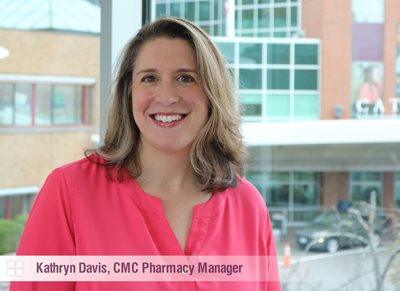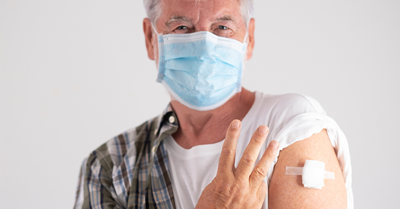You got the COVID-19 vaccine—that’s great! But do you need an additional shot? There is a lot of guidance from the Centers for Disease Control and Prevention. Here, we help you weed through it.
There are two categories that people fall into that make them suitable for an additional dose of the COVID-19 vaccine.

The additional dose, also called a 3rd dose, is for people who have already received the full course of mRNA vaccine (Pfizer or Moderna) and are moderately to severely immunocompromised. “These are people who might not fully respond to the first two doses of the vaccine because of their immunocompromised state. Their antibodies might not be as high as that of a healthy person,” says Kathryn Davis, CMC Pharmacy Manager (pictured). This additional dose should be given at least four weeks after the second shot.
Examples of people who meet this criteria include those who are being treated for cancer, have received an organ transplant, have immune deficiency disorders, or are on chronic medications that suppress the immune system (such as steroids). The CDC has a full list of example conditions. Your doctor should contact you if you are appropriate for an additional dose. However, people in New Hampshire can also self-identify at their local pharmacy as being immunocompromised and get the shot. For additional doses, it is recommended that people stick with the same vaccine they received for the first two doses.
Booster shots are recommended for a broader set of the population and are given six months or more after the completion of the first two doses of the mRNA. “These are for people whose antibody levels are expected to wane or decrease overtime,” says Davis. “The booster dose will increase your antibody levels so you are more protected going forward.”
 People who should get a COVID-19 vaccine booster include those:
People who should get a COVID-19 vaccine booster include those:
- Adults over 65 years of age
- Adults who live or work in a long-term care setting
- Adults over 50 with underlying medical conditions
- Adults 18 and older with certain underlying medical conditions and adults who are at increased risk for exposure and transmission because of where they work or live
The booster presents a stark difference to the additional dose for immunocompromised people: a booster doesn’t have to be the same vaccine that you received for your first two shots. Both the CDC and FDA advise that you can “mix and match” the booster to the primary doses. If you received one of the mRNA vaccines (Pfizer or Moderna) as your primary dose, you can receive either one of the other mRNA vaccines or the Janssen/Johnson & Johnson for your booster.
As for the Janssen/J&J vaccine, the CDC advises anyone over the age of 18 who received this one-shot vaccine to get a second shot—of either J&J or one of the mRNA vaccines—at least two months later, regardless of underlying conditions.
Why not have everyone get a booster? It’s a risk-benefit equation, says Davis. At this point, people who are at highest risk for exposure and transmission should seek a booster. “If you are a healthy adult with no underlying conditions, and you don’t have a high-risk lifestyle, your antibodies should be enough to protect you,” says Davis. It is something, however, that continues to be studied.
For more information on COVID-19 additional doses and booster shots, contact your primary care physician. To find a location to receive a vaccine, visit
vaccines.nh.gov.